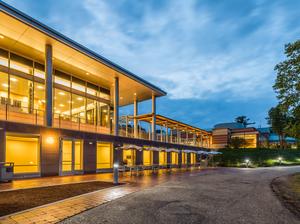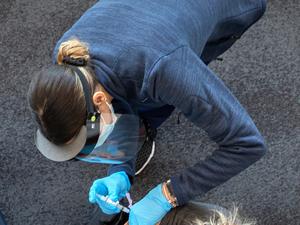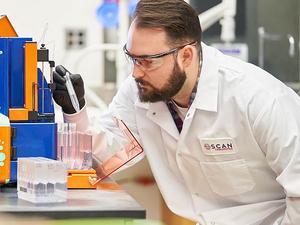
A new biotech startup has formally entered the scene: Nuvalent, founded in Cambridge in 2017, launched publicly on Wednesday with $50 million in Series A funding from Deerfield Management.
Nuvalent is focused on developing precision therapies for non-small-cell lung cancer. Its two lead programs both target cancer genes using enzyme blockers known as kinase inhibitors, with the goal of minimizing a patient's resistance to cancer treatments.
The technology underpinning the programs was developed by Matthew Shair, a chemistry and chemical biology at Harvard University.
Shair was first introduced to the team at Deerfield Management in 2017. At the time, Deerfield wanted to leverage Shair's expertise to solve problems with targeted cancer treatments.
"Very quickly, we started talking about the fact that many targeted therapies in cancer work well in the beginning, but then they stop, because many patients develop resistance to them," Shair said. "We focused on this idea of using chemistry and structurally based drug design to develop precisely targeted therapies for cancer."
Shair reached out to a longtime friend and fellow chemist, James Porter. The two had worked on and off together for about 20 years, most recently at Infinity Pharmaceuticals, where Porter had overseen product development. Porter agreed to join the budding venture as CEO at the end of 2017, and the two began to build out the team.
Shair and Porter wanted to make their venture scalable. Rather than hiring a team of dozens, they kept their headcount deliberately small, but they also ensured that each person they hired was well-connected and well-versed in their own area of expertise. Today, nearly four years after its initial founding, Nuvalent employs just 14 people.
Nuvalent is developing its two lead programs in parallel. The first targets ROS1, a cancer gene that often mutates to resist available treatments. Shair and his team developed a compound that specifically addresses common resistance traits. The compound is also designed to address targets in the brain, since non-small-cell lung cancer often metastasizes there. It also avoids structurally similar kinases so that it remains on target; as Porter noted, off-target therapies can drive cognitive errors.
Nuvalent's second program is similar but targets the ALK gene, whose mutated form can also drive non-small-cell lung cancer. Porter and Shair said the two molecules have the potential to be applied to other cancers down the line.
The startup expects the ROS1 program to enter the clinic in 2021 and the ALK program in the first half of 2022. Other programs addressing resistant cancers with clinically proven kinase targets are also in the works.
"I think we've all been touched in some way by cancer, so to have the ability to make therapies that we think could be transformative for patients is certainly a driving force," Shair said. "The learning we're making on initial targets and initial programs, we think, could be more general. They're ones that we think could be applied to many other cancers that follow these paradigms. We think we could make a large impact going forward."








